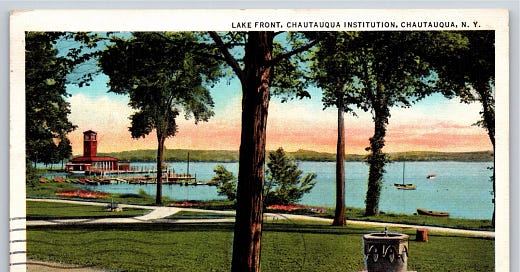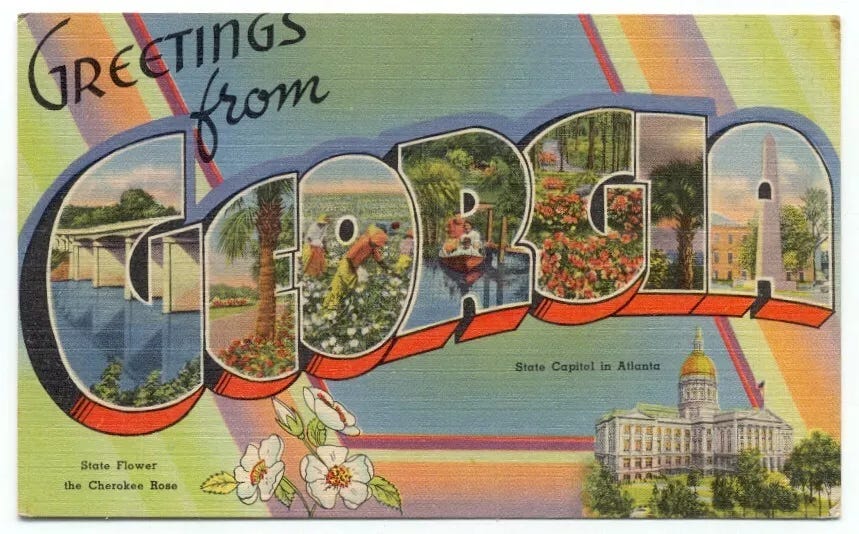Chief Askew's Diary: End of June 1930
As I take a vacation, I leave you with news from Newnan and the world
I am attending the Chautauqua Institution’s summer season week one in New York state, and have decided to give myself a vacation from writing. Thus I am leaving you with a long-ish post, free to all subscribers. (If you have never heard of Chautauqa, please click here.) I am looking forward to hearing from the Rev. Jim Wallis, author of The False White Gospel, Democratic strategist James Carville and his wife, Republican strategist Mary Matalin, and other stimulating speakers, as well as enjoying wonderful live music, modern art, and the natural beauty of the southwestern corner of New York state. I will be posting again on July 1.
The postcard above dates from 1937 but the view of Chautauqua Lake looks much the same today. It is being offered by a dealer on eBay. The postcard below dates from about 1940 and is also for sale on eBay.
June 23rd was the hottest day of the year so far in Coweta County, Georgia: 99 degrees in the shade and about 105 in the sun, Chief Askew noted in his diary. Unfortunately, the ditch digging had begun for the gas pipeline under these difficult weather conditions.
Over the next few days, the heat took its toll on the “Boys” doing the digging. “Several Boys digging ditches for the gas line got over hot yesterday and fell out,” he wrote one day. “One young man got in pretty bad shape and was sent to the Hospital.”
The following day was even worse. “White boys working with the gas Company still falling out,” he wrote. “85 dropped out yesterday and a number of them fell out this a.m. They say they are going to put 50 or 100 Negroes to work on that job tomorrow.”
“Gas people going right ahead putting in their pipelines,” he wrote on June 27. “They are working from 100 to 200 men inside City and are paying $2.50 per day.”
In other news during the last part of June 1930:
The Allies ended their 11-year occupation of the Rhineland with the withdrawal of French troops which had been there since 1918. The territory remained a neutral demilitarized zone until March 1936 when Hitler ordered its occupation by German troops.
President Hoover joined his wife at his fishing camp in Virginia for a weekend of relaxation. Mrs. Hoover had been there for some time recovering from injuries she sustained in a fall at the White House. Even while fishing, Hoover dressed in a business suit, tie, and high-collared shirt, as shown in this Library of Congress photo, though he did wear waders.
Charles and Anne Lindbergh welcomed the birth of their first child, Charles Jr., on June 22. The public’s attention would be riveted on the little boy’s kidnapping and murder less than two years later, dubbed “the crime of the century” by the press. After the conviction and execution of Bruno Hauptmann for the murder, the Lindberghs left America and lived in Europe for several years to escape the hounding of the press and public.
The first cotton blooms were spotted in Coweta County, according to an article in the Newnan Herald on June 27. Unfortunately, boll weevils were also in evidence. “One farmer says it looks hard [sic] that some confounded bug wants a bit at everything the farmer raises — and you can’t always tell which will win, bug or farmer.” An arsenic-based treatment, which was effective if not environmentally friendly — was being advertised in the Herald.






